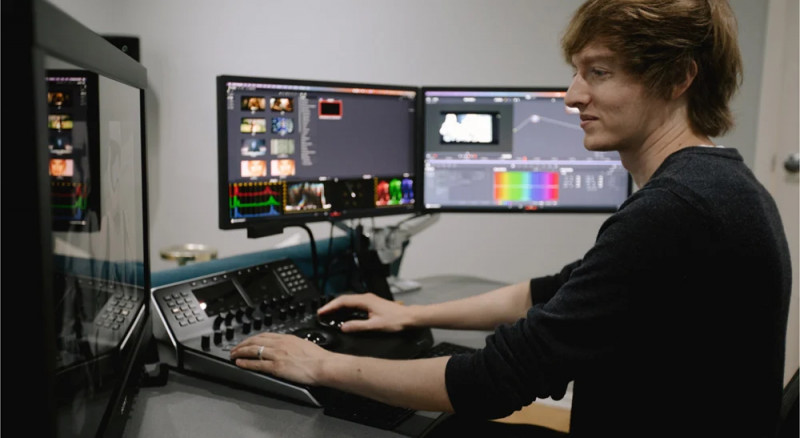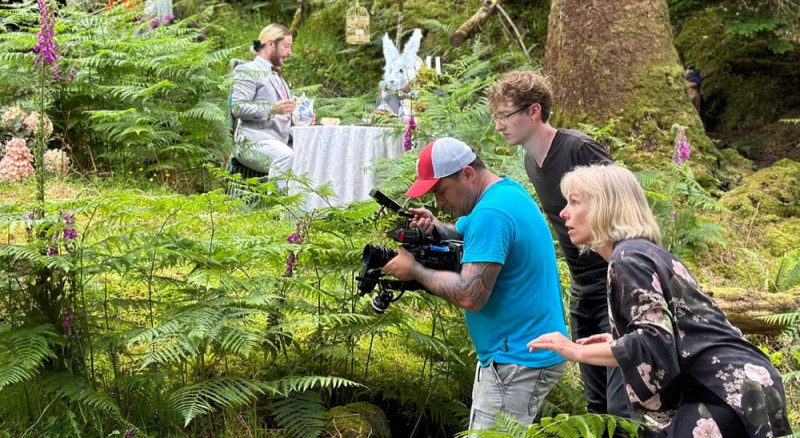RKM Studios Produces Music Videos Using Blackmagic Cloud
Nick Phoenix’s music videos shot with URSA Mini Pro 12K and completed using Blackmagic Cloud Store 20TB and Blackmagic Cloud
Blackmagic Design today announced that Los Angeles based full service production and post production house RKM Studios recently produced a series of music videos using Blackmagic Cloud, Blackmagic Cloud Store network storage solution and DaVinci Resolve Studio editing, grading, visual effects (VFX) and audio post production software.
When musical artist Nick Phoenix contacted filmmaker Ryan McNeal about a series of videos for his new album “Underdog,” McNeal was excited. “I really was intrigued by a couple of ideas Nick had for some fantasy themed music videos,” said McNeal. “As I looked at the album list and listened to the tracks, I felt a strong through line with three of the pieces, and had this idea to create a three part music video narrative following a young woman’s journey into a fantasy world where she is nearly consumed by revenge.” Phoenix loved the idea and the two set out to produce the project in Ireland, taking advantage of the epic scenery that fit the narrative of the videos.

While the concept was expansive, the budget was not, and McNeal was looking for the best ways to streamline every part of the process, including the combination of production and post production. “We knew we would be shooting various file formats, including Blackmagic RAW on the URSA Mini Pro 12K,” added McNeal. “We had a three day shoot, all on location, and wanted to be able to review dailies each day. We discovered the Blackmagic Cloud Store units and realized they not only provided fast, reliable storage but were also portable, as opposed to something mounted in a rack server. Additionally, we had an editor who would be working remotely while traveling, so suddenly the full feature set of Blackmagic Cloud, collaboration and the Cloud Stores became really appealing.”
During production, the team used two Blackmagic Cloud Store 20TB systems as redundant backup of principal photography on set. The Blackmagic Proxy Generator was used to keep up with proxy generation, and an additional 8TB Cloud Store Mini network storage solution stayed with the editor, syncing proxies and allowing him to begin assembling an edit during the shoot. “Everything just synced over the web rather effortlessly,” added McNeal.
Editor Paul Cole was brought on early in the process, and quickly realized the tools they would need for such an expansive shoot. “The biggest issue I’ve run into with other NLEs was the lack of collaboration tools,” said Cole. “These three videos had a fast turnaround, coordinating with the release of the band’s new album, which made time a factor. Using DaVinci Resolve Studio for all of our post production just made sense. That way we all could access the same footage, the same VFX, and same color all together as a team instead of working in multiple platforms to accomplish the same thing.”

McNeal was equally pleased with the ability to keep the entire post production pipeline in one package. “My team and I worked in a Collaborative Resolve Project, allowing us to simultaneously edit, color, sound design, and create VFX,” said McNeal. “Paul would be working in one room on a rough cut, and I would be organizing the footage or laying out sound design in another. Once we had a rough cut, I started color and we’d both work inside the same project without issues. No round tripping, no picture locks, no staggered schedule. All of post could happen simultaneously.”
McNeal, who directed the three videos but also color graded them, had a unique visual goal when he began the project, and with his strong background using DaVinci Resolve Studio as a colorist, knew the tools he could use to achieve his goals. “I really wanted to tell a sweeping epic, fantasy narrative with these three videos,” said McNeal. “Like most music videos, the dream has to be made on limited time and resources. But because of my experience in Resolve I was able to adapt on set. In the first video, ‘Ashes and Fire,’ we have a shot of our main characters walking along a cliff which we had to shoot in broad daylight. I knew at the time that in post production I could change the entire atmosphere of the shot to be a misty morning, while also compositing a dragon skeleton in the shot for a cool look. The best part is I did that whole composite in the Color page of Resolve.”
For Cole, flexibility was the key to thinking about post production in a new way. “One of the challenges I have faced with editing in the past was having to think of the process in steps instead of thinking of the project as a whole,” said Cole. “Usually I would send out cuts to be approved by clients, with only temp color and VFX, just to get the edit ‘locked.’ For these videos, we colored and added VFX as we worked, which allowed us to get comments on color, editing, and VFX all at once. Though it took me a minute to really get into the flow of this style of post production, now it is our preferred method of how we handle full post on nearly any project we tackle from start to finish.”

“We talk about collaboration in our industry as having a hand in the process,” added Cole. “With the Blackmagic Cloud and DaVinci Resolve collaboration tools, that is literally possible. Everyone on the post team all worked in one project, and had access to everything from assets, timelines and plugins to deliveries, etc. Being able to have multiple hands in the project all at one time was crucial for this workflow. Not only just for artists, producers and clients, but also other team members who are able to pull stills for socials or export assets for archiving while we are all working.”
“Blackmagic Cloud, DaVinci Resolve and the collaborative tools now available can really leverage a powerful feature set and unlock them from the tethers of the desk, office or server room,” added McNeal. “In the quickly evolving landscape of post production, I see this as a strong foundation. It really felt like looking into the future of post production.”